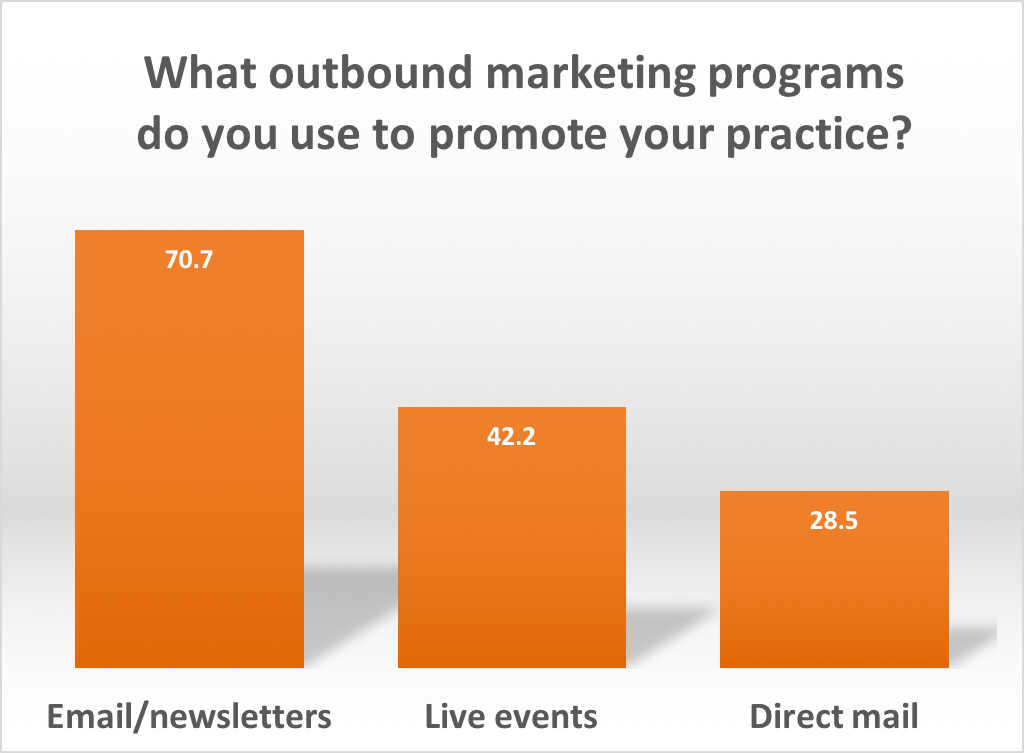Let me make a confession. The very first thought that occurred to me when I saw the data was, “We have a lot of work to do.”
Here’s one example of why. One of the questions asked, “What outbound marketing programs do you use to promote your practice?” A number of advisors wrote in “referrals,” even though that wasn’t one of the options listed. Other write-in answers were similar, like “word of mouth” and “prestige introductions,” whatever that means. My favorite response was: “None, expect to golf and fish with clients.”
Happy angling, I guess.
Let’s be clear. Referrals are not an outbound marketing program. They’re passive. Advisors just sit in their offices doing their jobs, expecting that the quality of their work will cause the phone to ring automatically. If advisors think that counts as “outbound,” we obviously need to do some serious education about the differences between organic growth and proactive marketing. I’ll tackle that issue in my next post.
The good, the bad and the ugly
For now, there are a few other findings I’d like to highlight.
According to the survey, 47.6% of advisors use social media to promote their practice. That’s a shockingly high number, given the amount of confusion (and legitimate compliance concerns) that so many advisors express about social media. Unfortunately, the survey doesn’t break down the category further. We can’t see what platforms they use. We don’t know what “using” social media means to them. Having an online profile? Posting frequently and sharing articles? Engaging with prospects? Those questions will require further study.
The most popular tools for promoting a practice were traditional, tried-and-true tactics. The chart below shows you the top three.

These programs have their place, but please note: they are very high-cost options in today’s digitally enabled world. Are they actually worth the expense? Do advisors test whether they’re cost-effective? Or do they simply repeat whatever they did last year?
In addition to asking about promotions, the survey also asks, “What marketing services do you outsource?”
Of the firms that outsource, 69.6% say they outsource website design and maintenance. That’s the top response by a large margin. Not public relations. Not marketing strategy—activities we know advisors have difficulty managing on their own. No, the most-outsourced marketing service is website maintenance.
Let’s think about this for a minute. Is website design and maintenance even a marketing expense at all? Isn’t it just part of the table-stakes infrastructure you need to run any business in 2017? At best, a website is part of your brand presence. But unless you’ve built it into a digital marketing machine, it just sits there. It’s a static online version of your firm brochure. It’s not active. It doesn’t attract new prospects. It’s not marketing.
So, we have advisors who think referrals are an “outbound marketing program.” And even more who think their static website is a marketing service. I guess the survey makes the problem fairly obvious.
What we have here is a failure to communicate.
Advisors aren’t actually sure what marketing is. At least, the word doesn’t hold the same meaning for advisors as it does for their service providers. They don’t share a common language. So, if we’re going to try to get everybody on the same page, first we have to make sure everybody can read it.
Next time, I’m going to share an idea that could help advisors understand what marketing is—and what it isn’t.